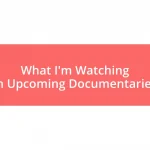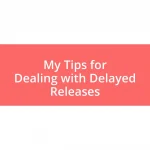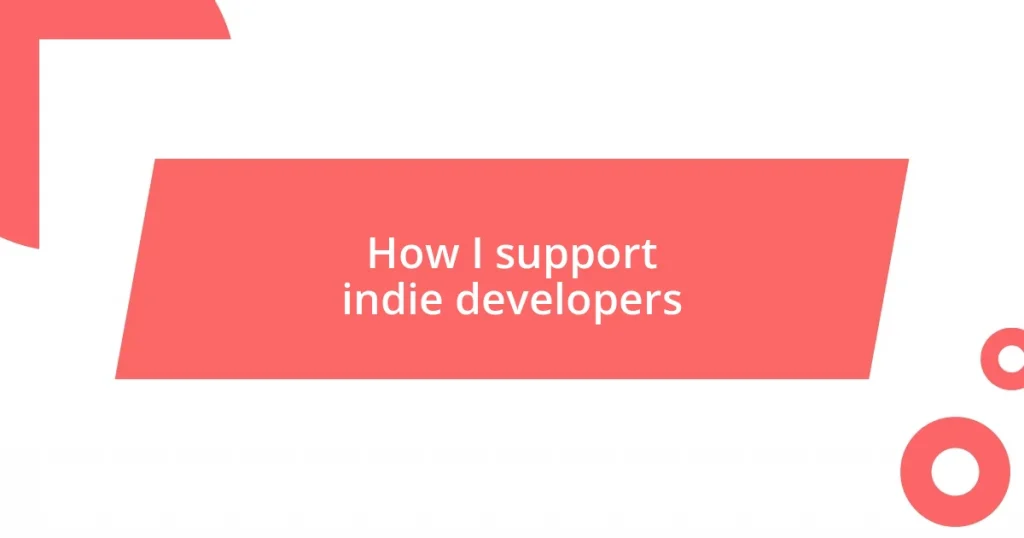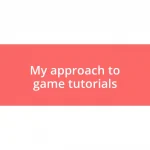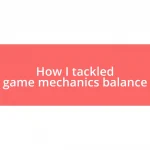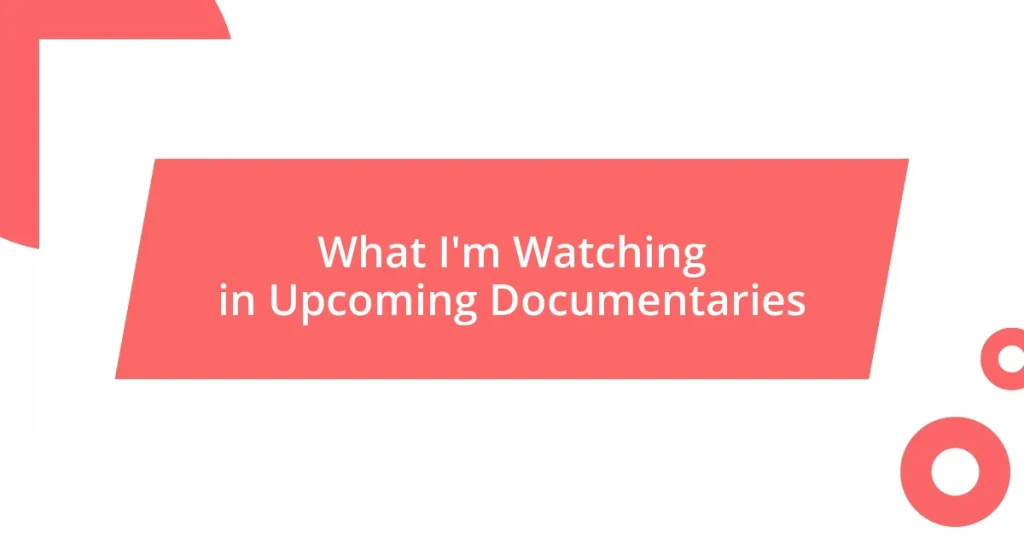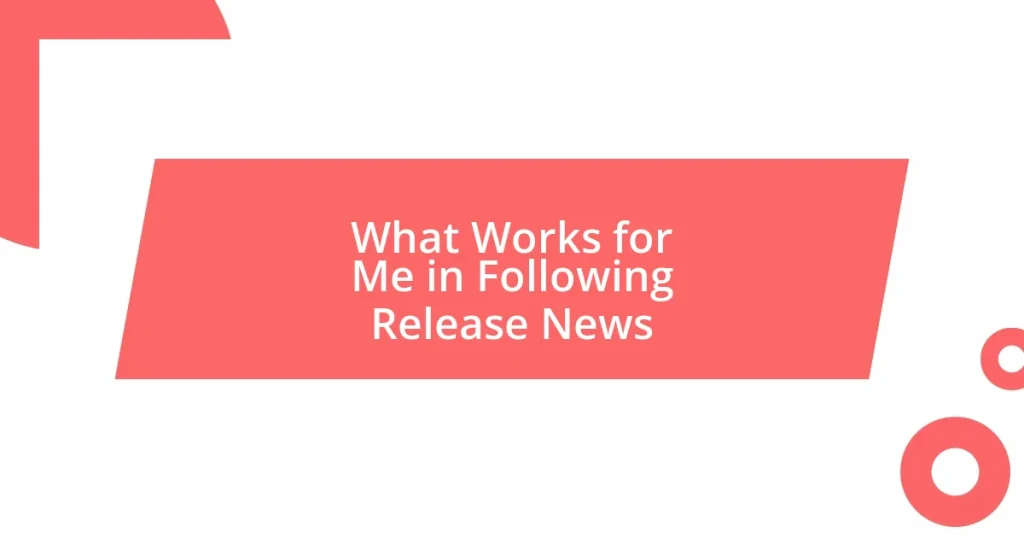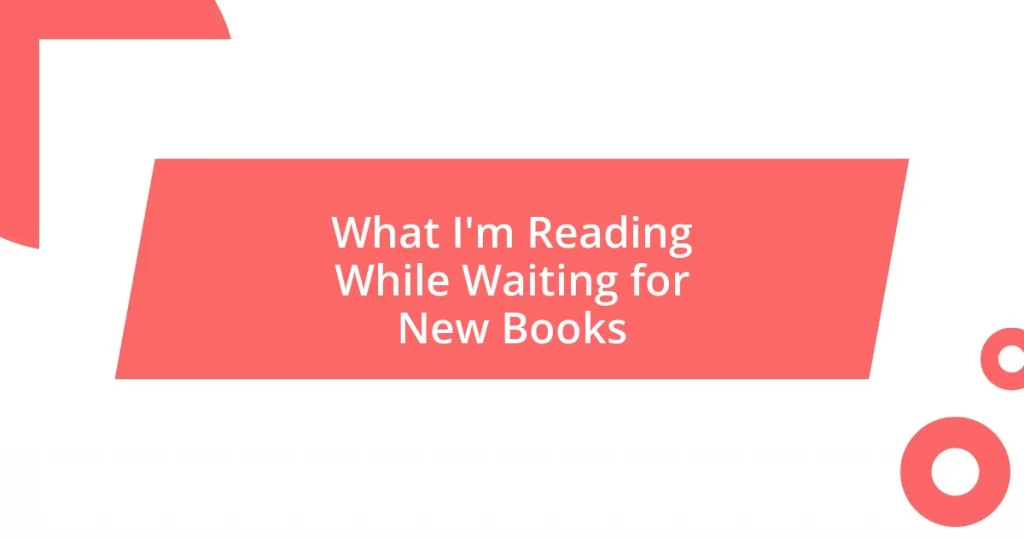Key takeaways:
- Indie developers face challenges such as limited funding and need for community support, mentorship, and access to resources.
- Creative promotion strategies, including social media engagement and collaboration with influencers, significantly enhance the visibility of indie games.
- Celebrating indie success stories fosters community spirit and motivates developers, highlighting the importance of recognition and resilience in their journeys.

Understanding Indie Developers’ Needs
Indie developers often face significant challenges due to limited resources and funding. I remember attending a local game jam where passion radiated from every corner. The excitement was palpable, yet many teams expressed concerns about funding their projects long-term. This raises the question: how can we, as supporters, help bridge that gap?
Another critical need for indie developers is community support. I’ve seen firsthand the power of a supportive network at events; it transforms ideas into tangible creations. It makes me ponder—what can we do to foster environments where indie voices are listened to and celebrated? Their dream projects deserve that kind of nurturing.
Access to knowledge and tools is also a major hurdle. Developers often juggle learning new technologies while trying to create something unique. I once spoke with an indie developer who expressed frustration over navigating complicated software without enough guidance. In my experience, providing resources and mentorship can be a game-changer for them, but how can we best offer that without overwhelming them?
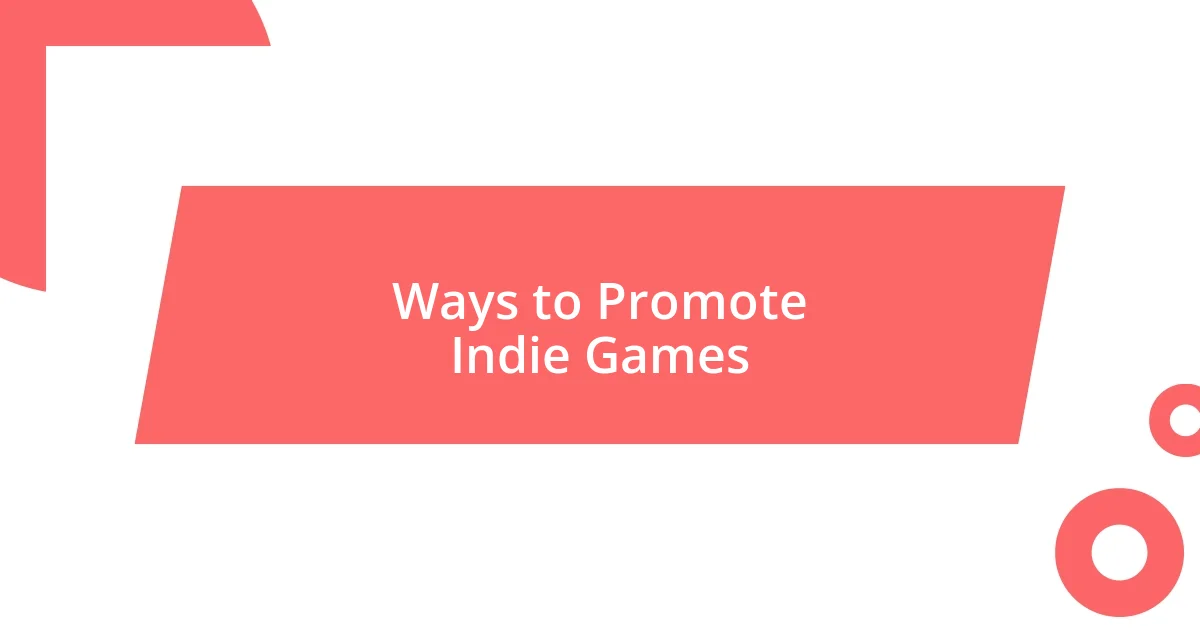
Ways to Promote Indie Games
Promoting indie games requires creativity and strategic effort. From my experience in the gaming community, I’ve learned that personal engagement is key. When I participated in a local indie showcase, fans connected with developers over snacks and shared stories, which built a strong bond. Those interactions often lead to avid support, revealing the impact of a grassroots approach.
To effectively promote indie games, consider these strategies:
- Leverage Social Media: Share development updates, behind-the-scenes content, and artist showcases to build anticipation.
- Participate in Game Jams: These events not only foster community but also generate excitement around new concepts.
- Create Engaging Content: Host livestreams or developer Q&As to connect with potential players and share insights.
- Collaborate with Influencers: Find content creators who align with the game’s vision; their endorsement can reach a wider audience.
- Utilize Forums and Indie Game Platforms: Engage with forums like Reddit, or sites like itch.io, allowing for direct feedback and community involvement.
Each approach I’ve seen makes a tangible difference, and it’s inspiring to see how a passionate push can elevate indie projects from obscurity to recognition.
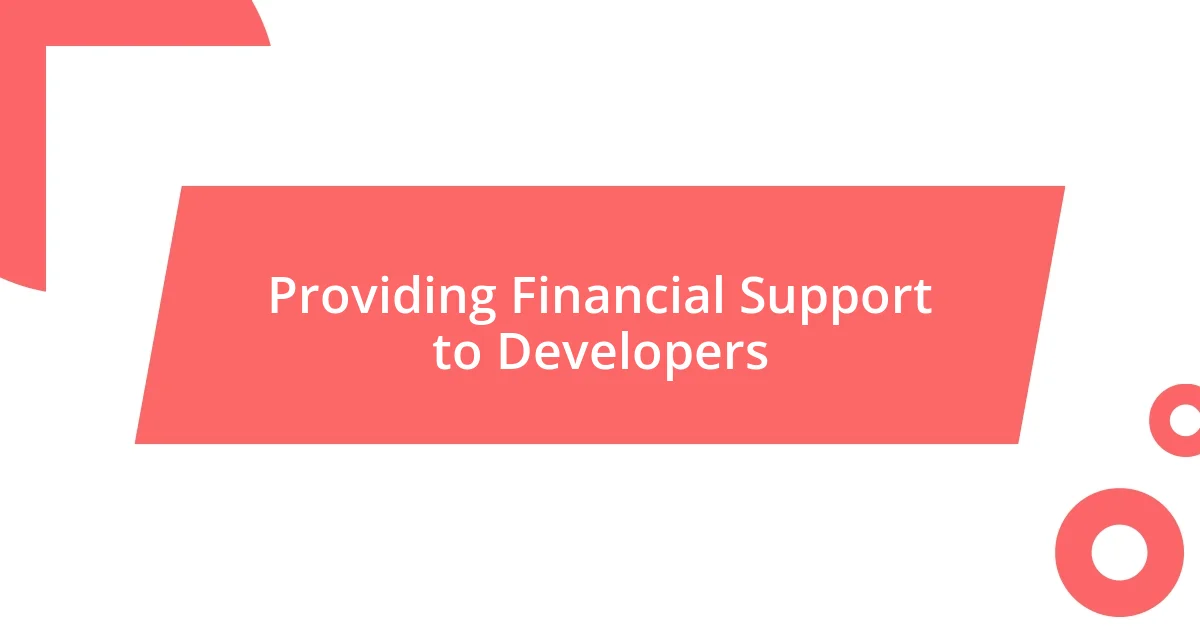
Providing Financial Support to Developers
Providing financial support to indie developers can take many forms, and I’ve encountered a variety of methods that truly make a difference. For instance, crowdfunding platforms like Kickstarter and Indiegogo serve as powerful tools, but they require a good deal of strategy. I remember backing a small team that had an impressive pitch but struggled to convey their vision, which made me think about how critical a solid presentation is in driving financial support.
Direct donations can also be impactful, especially when paired with community engagement. One time, I joined a fundraising stream that not only raised funds but also created a strong sense of community around a shared goal. Seeing the developers’ reactions to the support was incredibly moving; it reminded me that financial backing is as much about belief in their project as it is about the cash itself.
Investing in early access games is another way I’ve supported indie developers financially. I’ve participated in numerous early access programs, where my feedback helped shape the final outcome. This process not only empowers developers but also creates a sense of ownership for players, as we contribute to something special and unique.
| Method of Support | Description |
|---|---|
| Crowdfunding | Using platforms like Kickstarter to gather financial backing from fans. |
| Direct Donations | Contributing directly to developers through events or platforms. |
| Investing in Early Access | Buying games before their official release to provide upfront funding. |
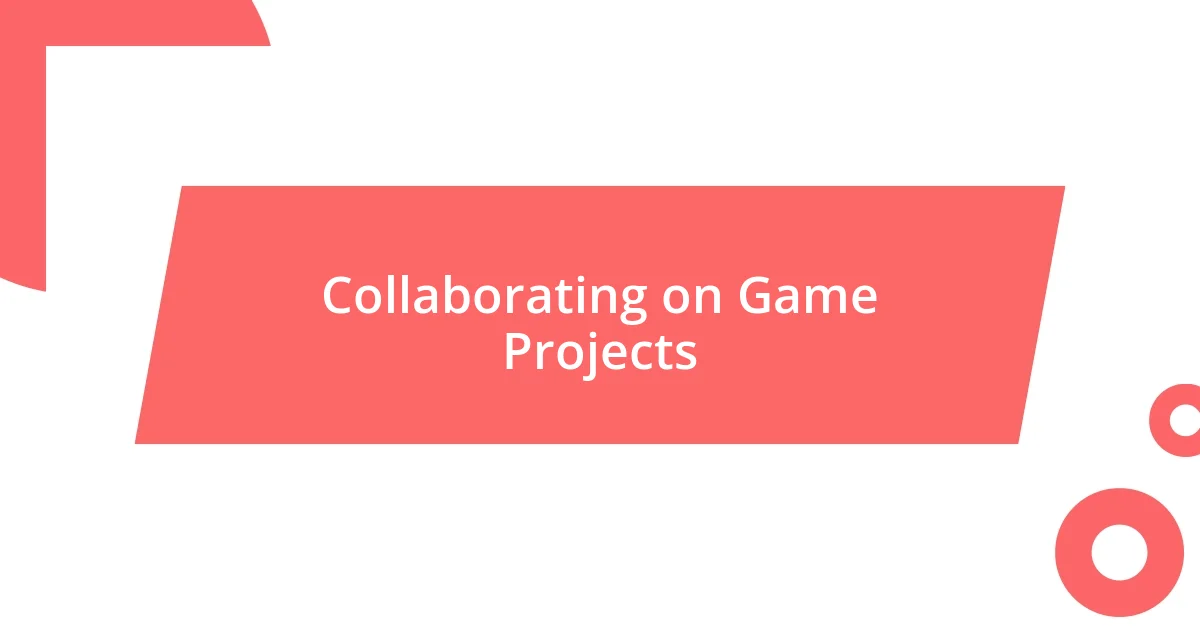
Collaborating on Game Projects
Collaboration on game projects can be one of the most rewarding experiences in the indie scene. I remember joining a small team of aspiring developers and artists for a game jam project. The energy was electric as we bounced ideas off one another, and it taught me how diverse perspectives can elevate a concept beyond what any one person could achieve alone. Have you ever felt that rush of creativity when you’re surrounded by passionate individuals? It’s truly contagious.
Working closely with developers also involves sharing skills and resources. During a collaborative project, I offered my sound design expertise, helping to craft an immersive audio experience that brought the game world to life. I witnessed firsthand how that teamwork not only enhanced the game but also built camaraderie among us as we celebrated little victories together. Those moments of connection really reinforce why collaborative environments are essential in indie game development.
But let’s not overlook the challenges that come with collaboration. I once faced a situation where differing visions clashed, causing tension within the group. It made me realize that effective communication is vital; we had to take the time to listen to each other’s ideas and find common ground. Have you navigated tricky discussions in a collaborative setting? From my experience, it’s these very challenges that can lead to stronger projects and even deeper relationships among team members.
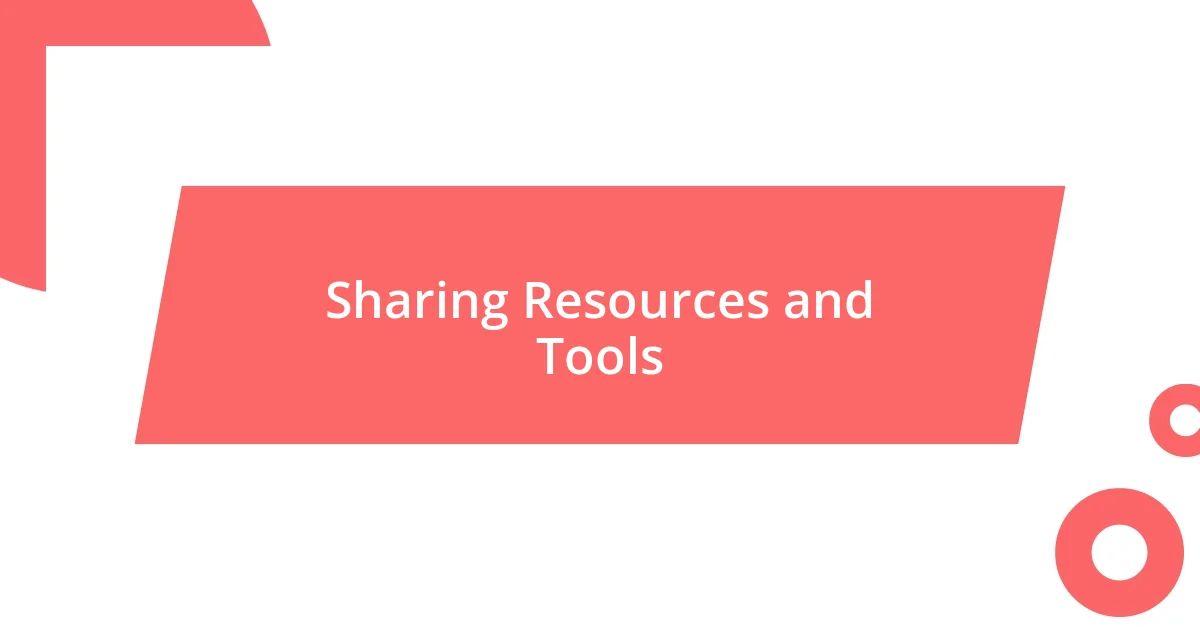
Sharing Resources and Tools
Sharing resources and tools is crucial in supporting indie developers, and I’ve seen it firsthand in a variety of settings. For instance, I recently came across a fantastic online repository that compiled free assets, software, and tutorials specifically tailored for indie game developers. I remember the excitement I felt when I discovered adorable game sprites and handy coding libraries that significantly simplified my own projects. Have you ever stumbled upon a resource that completely changed your perspective on game development?
I also believe in the power of knowledge-sharing. Once, I hosted a casual online workshop where I guided budding developers through the intricacies of game optimization techniques. The exchange of ideas was invigorating, and the participants’ “aha” moments reminded me of my early days when I relied heavily on community insights. It’s rewarding to pass along what I’ve learned, fostering a sense of collaboration that really strengthens our community.
Moreover, I actively encourage indie developers to tap into social media platforms and forums to share their experiences. I find platforms like Reddit and Discord invaluable for connecting with other developers and exchanging tools, techniques, and even emotional support. I vividly recall one evening spent in a Discord chat, where someone shared their struggles with motivation. It sparked a heartfelt conversation that not only uplifted them but also reminded me of the importance of camaraderie in our journey. Have you ever found a community that felt like a safe haven amidst the chaos?
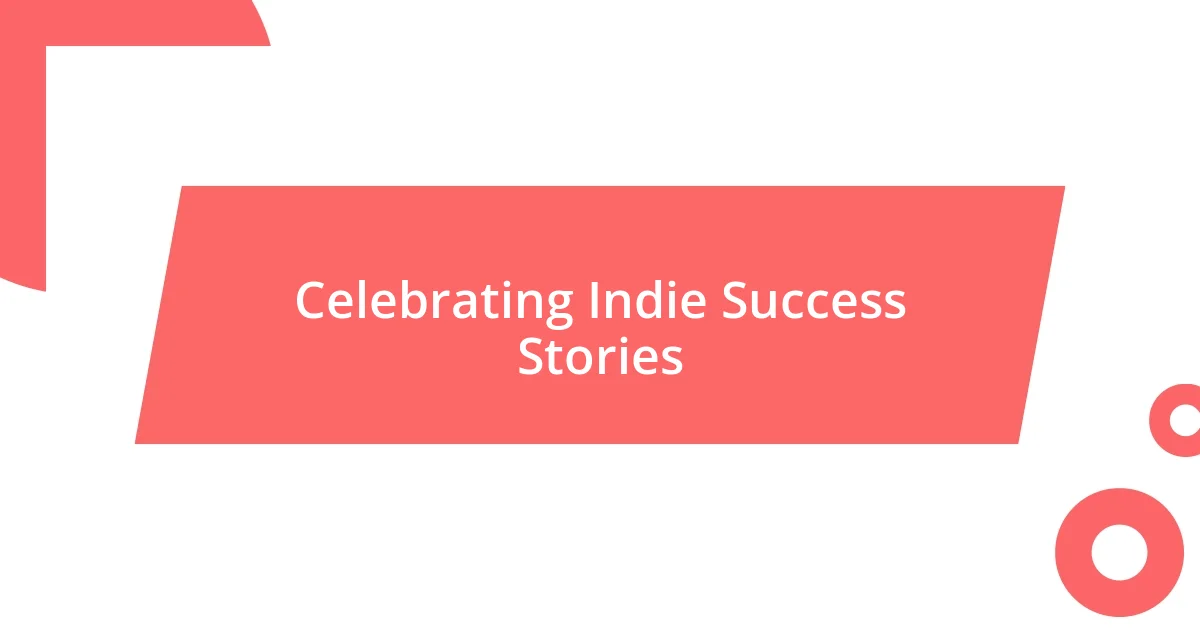
Celebrating Indie Success Stories
Celebrating indie success stories truly lights a fire in my heart! I recall the launch of a charming little game created by a duo of developers I had the pleasure of mentoring. The joy on their faces as they watched players engage with their creation, mirroring their visions and dreams, was absolutely priceless. Have you ever seen a friend achieve something incredible? That sense of elation is something I strive to support every day in our indie community.
Another moment that stands out to me is when I attended an indie game festival where local developers showcased their projects. One game, crafted by an aspiring team, stood out for its unique blend of storytelling and mechanics. I remember their eyes lighting up when they received praise from attendees and industry veterans alike. That palpable excitement reminded me of my early days; it’s such a boost to see hard work pay off. Isn’t it amazing how recognition can propel creators to new heights?
Then there’s the story of a developer who started with a simple mobile app and ended up creating a beloved franchise. I had the chance to interact with him during a panel, where he shared his journey filled with ups and downs. The way he spoke about his failures as lessons rather than setbacks resonated deeply with me. It made me wonder: how many success stories are born from a relentless spirit? Every indie success is not just a milestone but a testament to tenacity and passion in our vibrant community.
